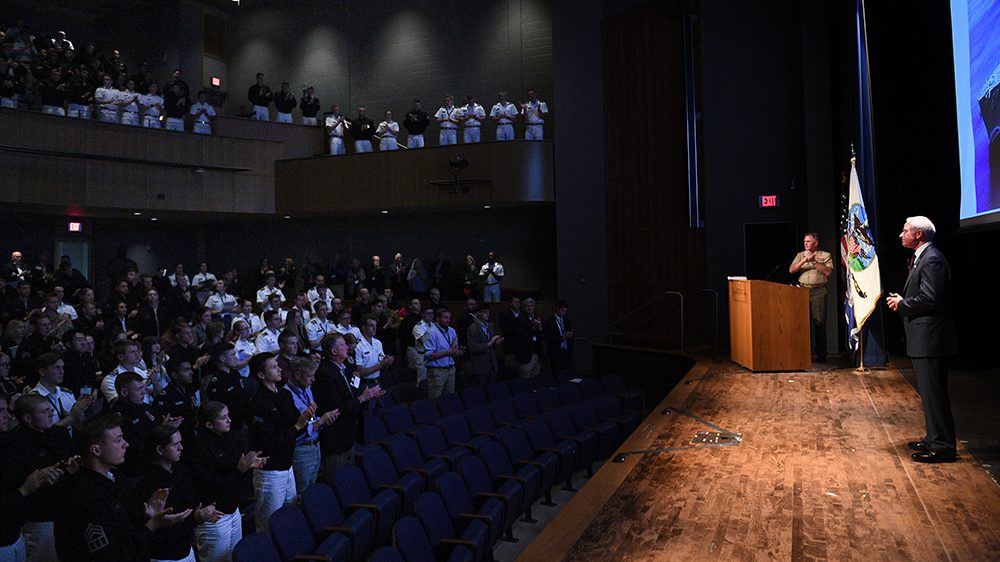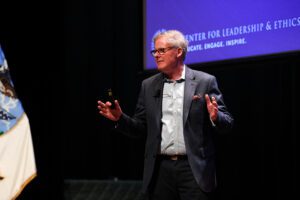Leadership Conference Held at VMI

Retired U.S. Navy Cmdr. Kirk Lippold receives a standing ovation after his inspirational talk on saving the USS Cole.—VMI Photo by H. Lockwood McLaughlin.

Retired U.S. Navy Cmdr. Kirk Lippold receives a standing ovation after his inspirational talk on saving the USS Cole.—VMI Photo by H. Lockwood McLaughlin.
The 14th annual Leadership and Ethics Conference at Virginia Military Institute was held in Marshall Hall Oct. 30–31, 2023. This year’s theme was “Leading During Crisis: Culture, Conflict, Collaboration” and attracted students from across the country. The conference focused on the challenges of adapting to personal and organizational crises with courage and integrity as an individual and as a leader.
Nearly 200 participants—with students from many colleges, universities, and military academies from across the nation, including Christopher Newport University, East Tennessee State University, Hampden-Sydney College, Liberty University, Mary Baldwin University, Norwich University, Texas A&M University, The Citadel, U.S. Coast Guard Academy, U.S. Military Academy, University of North Georgia, Virginia Tech, as well as many VMI cadets—gathered to hear inspirational speakers, participate in collaborative activities, and network. Central to the conference’s programming were small group discussions and speakers focusing on crisis leader self-assessment, behavioral adaptability, crisis preparation, communication planning and execution, and building effective teams.
Maj. Gen. Cedric T. Wins ’85, superintendent, welcomed attendees the first morning and challenged them to learn how leaders and their followers can build strong teams that anticipate and prepare for the complexity of crises of any kind, whether man-made, natural, or even slowly evolving ones. “Over the next two days, you will learn about yourselves, and how to examine crisis leadership through culture, preparedness, and response,” Wins said.
The speaker kicking off the conference was the H.B. Johnson Jr. Class of 1926 Distinguished Speaker, Eric McNulty, associate director of the National Preparedness Leadership Initiative at Harvard University. McNulty is an expert in leadership, crisis management, and negotiation, and co-author of numerous books, including “You’re It: Crisis, Change, and How to Lead When it Matters Most” and author of “Three Critical Shifts in Thinking for the Evolving Leader” and “Your Critical First 10 Days as a Leader.”

Eric McNulty discusses meta leadership in Gillis Theater.—VMI Photo by H. Lockwood McLaughlin.
McNulty opened by declaring the world is currently in interesting times: “We have a war in Europe, the Middle East is on fire, the U.S. has set yet another record for billion-dollar-plus disasters resulting from natural hazards, and we’ve got political polarization.” He stated that throughout history, there are periods of relative calm, instability, and prosperity, and he believes the world is moving toward a time of more disruption. He counseled the students in the audience that whether they serve in the military or work in the civilian world, they will face a much greater set of disruptions and, as such, must master the dimensions of meta leadership—as McNulty defined it, being able to look at the big picture and take in the broader view.
McNulty closed by reminding his listeners of what’s not at stake in dealing with stressful crises. “When I go home at the end of the day, my dog is always there wagging his tail to greet me. He doesn’t care if I had a great day or a lousy day, he is just happy to see me. Your family and friends will always be there to love and support you. That is what is truly important.”
Kevin Black ’99, veteran U.S. Army officer, executive coach, and strategic adviser, spoke on “Behavioral Adaptability.” He opened by asking his audience, “What is the primary driver for a crisis?” After a few responses, Black boldly declared, “It’s humans. Think about COVID. The reaction to COVID was worse than COVID itself. Why is the reaction to a crisis always worse than the crisis? Because of human complexity and personality.”
To illustrate his point, Black displayed a picture of a multi-layer cake and listed examples of layers of a human personality. “Perception, culture, environment, ego, life experiences, religion, philosophy, worldview, psychology—all these factors affect how a person reacts to chaos.” He continued by noting there are two fundamental orientations to leadership: Mission-oriented leaders, who are focused on the goal and want to win at all costs, and people-oriented leaders, who are focused on engaging with people and gaining trust through relationships. Every leader has a behavioral profile that leans one way or the other, often changing in a seesaw fashion, depending on the situation.
Black concluded by stating that everyone is unique and comes to their leadership roles with their own perspectives. “If we were all tasked with writing a book about sharks, no two books would be the same. Remember that as a leader. The people you lead will all be different, and as a leader, you must be mindful of that with your leadership style.”
The Caroline Dawn Wortham ’12 Leadership Speaker was Jan Rader, retired fire chief for the city of Huntington, West Virginia, and the first woman to reach the rank of chief for a career department in the state of West Virginia. Rader came to national prominence after the release of the short documentary “Heroin(e)” by Netflix in September 2017. In April 2018, she was chosen as one of Time magazine’s 100 most influential people in the world. She currently serves as director of the Mayor’s Council of Public Health and Drug Control Policy in Huntington.
Rader shared Huntington’s history of dealing with the evolving illegal drug trade throughout her career. “When I started with our fire department, we would ride out on emergency calls, do our tasks, put out fires, then all of a sudden, we’re being called out for overdoses. We wondered what was going on. We didn’t understand the big picture that life was changing on our streets,” she shared. At this point, she knew she wanted to affect change in drug trafficking in Huntington.
In 2013, the city started a program called River to Jail. “If a dealer came across the Ohio River into Huntington to sell drugs, they were going to go to jail. Within three months, there were 226 arrests, but within two weeks, you couldn’t tell any arrests had been made. That’s how many people were waiting in the wings for their opportunity to sell drugs,” recalled Rader. They changed strategy and focused on the demand side of drug trafficking in addition to the supply side, and Steve Williams, Huntington mayor, began an Office of Drug Control Policy.
Because of her nursing background, Rader was asked to be a member of the new agency in addition to her fire chief duties. “It was me and two others. We traveled 45 minutes from Huntington to visit a Harm Reduction Program. We observed how people were responding to getting clean syringes, wraparound services, referrals to treatment, and help with life in general to make themselves better. Clearly, the program was a success. We decided we had to do this for our people, and that was the beginning of the path we went down,” she reported. The office began to keep real-time data on tracking overdoses, as well as educating the community.

Jan Rader shares how the city of Huntington, West Virginia, battled drug trafficking.—VMI Photo by H. Lockwood McLaughlin.
Rader ended by telling her audience that communication is key. “You must have good communication skills, listen to your people, and validate what they are experiencing. You must be flexible and not afraid to fail because I’ve learned a lot more from my failures than I ever did from my successes. Be compassionate; it changes the way you lead when you open your heart and see how everybody else lives.”
Bob Foresman ’83 and Miguel Monteverde ’66, shared practical advice and personal anecdotes in smaller breakout sessions. Foresman has had a career in emergency management and preparedness, and Monteverde had a long career in media relations and crisis communications—both in the military and as a civilian.
Stephen Lowe, Ph.D., VMI adjunct professor, presented an in-depth case study workshop on the Mann Gulch forest fire in 1949. The interactive session had attendees apply the knowledge gained from earlier speakers to analyze the preparedness, leadership, followership, and communication aspects of the tragedy, in which 12 U.S. Forest Service smokejumpers died. He was joined by former Hotshot smokejumper and current Lexington resident, Christian Duncan.
The keynote speaker of the event was retired U.S. Navy Cmdr. Kirk Lippold, commanding officer of the USS Cole when it came under terrorist attack by al Qaeda in the port of Aden, Yemen, Oct. 12, 2000, and author of “Front Burner: Al Qaeda’s Attack on the USS Cole.”
Lippold relayed his story of what is considered to be one of the most brazen acts of terrorism by al Qaeda prior to 9/11. His rapid-fire recitation kept listeners hanging on to his every word, and his attention to detail allowed them to visualize themselves on the deck of the ship on that fateful day.
When Lippold took command of USS Cole, he had one year to get the ship ready for deployment. He made sure his crew were all painstakingly well-trained for their specific jobs so they could respond automatically under a crisis. “They weren’t happy about the intense training I put them through at the time, but two months later, when we got hit, they had the competence to know if someone was missing from their station, and the confidence to step up into those now vacant positions. They were able to do what was necessary to save our ship and save our shipmates,” Lippold stated.
USS Cole was first deployed to the coast of the former Republic of Yugoslavia to provide support for 14 days, then on to the Middle East. Because they had been held back for two weeks, in order to reach their destination in time, they had to race across the Mediterranean and down the Red Sea at double the normal speed and burned a lot of gas. They pulled into the port city of Aden, Yemen, for a routine fueling stop. As the ship was taking on fuel, a small bomb-laden boat had pulled alongside and detonated explosives, ripping a 40-foot-wide hole in the ship and killing 17 and injuring 39 crew members.
After the blast, Lippold discovered that the uninjured members of his crew had taken it upon themselves to set up a triage center for the injured, provide damage control of the ship, and conduct security watches to prevent further attacks. Lippold’s priority was to save the ship. He paused his narrative to advise the audience on making decisions during a crisis. “You start making decisions based on the best information you have at that moment. As time moves forward and you get better information and you need to change the decision, change it! Even if it means you have to do a 180-degree change. That’s one of the things that has to constantly happen during a crisis. Don’t get locked in and feel you’ve got to stick with the previous decision.”
Next year’s Leadership Conference will be held Oct. 28–29, 2024, with an announcement of the theme and title coming in the spring. To stay informed, visit the conference website and join the mailing list at conferences.vmi.edu/leadership.
Editor's Note: Story originally published by Virginia Military Institute.